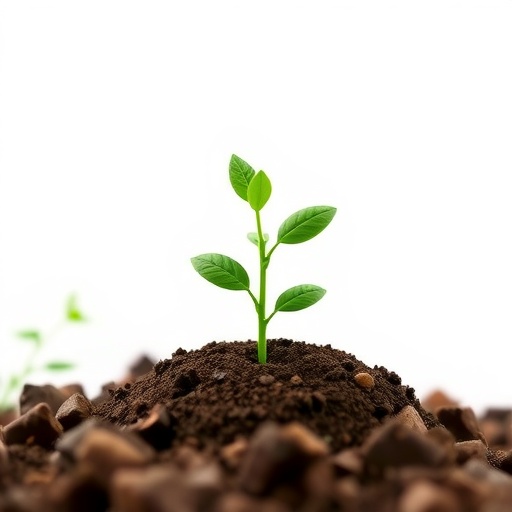In the quest for sustainable agricultural practices, researchers are increasingly focused on the development and use of organic substrates and fertilizers. A pioneering study led by Eshun and colleagues delves into a novel organic substrate and fertilizer formulation, aiming to enhance crop production while being environmentally friendly. This research represents a significant leap forward in the field of agronomy, addressing critical concerns about food security and sustainable farming practices.
The urgency of advancing sustainable agriculture cannot be overstated. With the global population projected to reach nearly 10 billion by 2050, the demand for food will intensify, placing unprecedented pressure on farming systems. Conventional farming methods often rely heavily on synthetic fertilizers and pesticides, which can degrade soil health and contribute to environmental degradation. Therefore, innovations in organic farming methods are essential to develop practices that are not only productive but also ecologically sound.
The study conducted by Eshun et al. investigates an innovative organic substrate designed to improve soil fertility and plant growth. This substrate combines various natural materials, offering a nutrient-rich environment tailored for optimal crop yield. The researchers meticulously analyzed the composition of the substrate, ensuring it supports beneficial microbial activity. Healthy microbial populations are critical for nutrient cycling in the soil, which in turn facilitates plant growth and resilience against pests and diseases.
In their experimental design, the team applied the new substrate to several crop types, monitoring key performance indicators such as growth rate, yield, and overall plant health. The results were promising, indicating that the organic substrate significantly outperformed traditional growing mediums. This success could revolutionize the way crops are cultivated, especially in regions heavily reliant on conventional agricultural practices.
One of the key advantages of using organic substrates is their role in improving soil structure. Unlike synthetic fertilizers, the organic components assist in building and maintaining soil aggregates, which enhance water retention and aeration. In arid regions or areas susceptible to drought, this characteristic becomes particularly valuable, as crops can sustain themselves through less frequent watering. As climate change continues to exacerbate water scarcity, such innovations may prove critical in ensuring food security.
Moreover, the study sheds light on the ecological benefits of adopting organic substrates. By reducing reliance on chemical inputs, farmers not only decrease production costs but also contribute to reducing the chemical runoff that can harm local waterways and ecosystems. This holistic approach to farming not only aims for productivity but also for the resilience and sustainability of agricultural systems, harmonizing food production with environmental conservation.
Furthermore, the novel organic fertilizer formulated alongside the substrate adds another layer of sophistication to agricultural practices. This fertilizer is designed to release nutrients slowly, minimizing the risk of leaching and thus ensuring that plants receive a steady supply of nutrition. This gradual nutrient release supports better root development and overall plant vigor, enhancing both the quantity and quality of crops produced.
The implications of this research extend beyond field experiments. If adopted widely, such organic formulations have the potential to improve the livelihoods of farmers globally, particularly in developing nations where resources might be limited. By providing an accessible solution that mitigates the adverse effects of climate change, these innovations empower farmers to achieve greater agricultural yields while maintaining ecological balance.
In addition to improving crop production, the formulation’s adoption can have significant economic repercussions. Farmers can reduce their dependence on expensive synthetic fertilizers and pesticides, translating to better profit margins. As awareness grows about the environmental impacts of traditional farming practices, consumers are also gravitating towards sustainably produced food, opening new markets for organic produce. This trend represents not only an ethical choice for consumers but also a lucrative opportunity for farmers embracing innovative agricultural methods.
However, transitioning to organic farming methods is not without challenges. Education and training for farmers on the use of these new substrates and fertilizers are crucial. Effective communication of the benefits and implementation strategies will foster greater acceptance and utilization of organic farming practices across different agricultural landscapes. Collaborative efforts among agricultural institutions, governments, and NGOs will be crucial in facilitating the transition, ensuring that farmers are well-equipped with the knowledge and resources necessary to adopt these sustainable practices.
The research results potentially pave the way for future studies and advancements in organic farming. As knowledge accumulates regarding different organic materials and their synergistic effects, there is an opportunity to innovate further in soil care and crop production. Ongoing research is essential for optimizing formulations and tailoring them to specific crops or regional conditions, thus enhancing efficacy and application likelihood.
In conclusion, Eshun’s research marks a significant advancement toward sustainable crop production through the use of organic substrates and fertilizers. The promising results underscore the potential benefits of these innovations, which can lead to improved crop yields, enhanced soil health, and environmental conservation. As this research garners attention in the agricultural community, it reinforces the importance of reimagining farming practices to align more closely with ecological principles.
To truly revolutionize agriculture for future generations, researchers, farmers, and policymakers must continue to collaborate in advancing this vital field. With the right tools and strategies, it is possible to cultivate a sustainable agricultural landscape that meets the demands of an ever-growing population while respecting the ecological balance of our planet.
Subject of Research: Organic substrate and fertilizer formulation for sustainable crop production
Article Title: Analyzing a novel organic substrate and fertilizer formulation for sustainable crop production.
Article References: Eshun, F., Acquah, S.J., Gbedemah, S.F. et al. Analyzing a novel organic substrate and fertilizer formulation for sustainable crop production. Discov Agric 3, 112 (2025). https://doi.org/10.1007/s44279-025-00211-w
Image Credits: AI Generated
DOI:
Keywords: Sustainable agriculture, organic substrate, fertilizer formulation, crop production, soil health.




